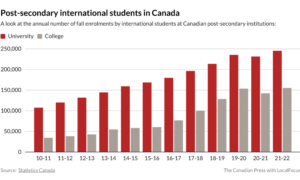
Canada's Strategy to Manage International Student Permits in 2024: A Detailed Analysis
https://www.senecapolytechnic.ca/about/reports/annual-report/Seneca-at-a-Glance-2023.pdf
In response to the escalating numbers of international students flocking to Canada for higher education, the government has unveiled a comprehensive plan aimed at curbing the issuance of study permits for the upcoming year. The strategy, known as the Net Zero First Year Growth Model, is designed to stabilize the intake of post-secondary students while ensuring adequate support and resources for their academic endeavors in the country.
Under this model, a national cap on study permit applications has been implemented, with meticulous calculations determining the target number of approved permits for 2024. The core principle behind this approach is to align the intake of international students with the number of expiring study permits from the previous year. Through careful consideration of various factors, including the percentage of students seeking permit extensions annually, a revised target of 364,000 approved study permits emerged for 2024.
However, certain categories of international students, such as those pursuing primary and secondary education or advanced degrees like master’s or doctoral programs, are exempt from this cap. By deducting the estimated volume of these exempt groups from the 2024 target, a final target of 236,000 approved study permits was determined
This equates to an approximate allocation of 393,000 study permit applications for the upcoming year. The government emphasized that these figures serve as a foundation for informed decision-making regarding allocations in subsequent years, reaffirming its commitment to collaborate with provinces and territories to bolster the International Student Program.
The allocation process for provincial and territorial study permit applications has been concluded, marking a crucial step in the implementation of the national cap on international student enrollment. The allocation model aims to ensure equitable distribution while accommodating regional dynamics, with allocations based on population share and adjustments made to limit expansion or mitigate declines in student intake.
Provinces anticipating growth received adjusted allocations aimed at fostering controlled and sustainable development, while those expecting a decrease in student intake received allocations aligned with broader regional immigration goals. Additionally, top-ups were implemented for provinces with approval rates lower than 60%, ensuring equitable access to study permits. Approximately 552,000 study permit applications have been allocated to provinces and territories under the national cap, projected to yield approximately 292,000 approved study permits. This reflects a 28% reduction from 2023 levels for the groups included under the cap.
The government acknowledged the dynamic nature of international student enrollment, recognizing that various factors may influence the final number of students arriving in Canada in 2024. The data gathered from this allocation process will inform future decisions on allocations for 2025, highlighting the government's commitment to collaborative efforts with provinces and territories to support the success of international students in Canada.
Canada has been a popular destination amongst international students considering the easy pathway to the PR. However, in the recent years post the COVID-19 things have not been going very smoothly for students which has also impacted the canadian economy as well.
On January 22, 2024, the minister of Immigration Mark Miller announced a 2 year cap on International students in order to control the growing housing rent in Canada and to lower the burden on International students who are already present in Canada. The cap would mean that only 360,000 study permits will be issued from the year 2024 to 2026. In the press conference the minister specifically mentioned private colleges.
"It's unacceptable that some private institutions have taken advantage of international students by operating under-resourced campuses, lacking support for students and charging high tuition fees, all while significantly increasing their intake of international students," Mr Miller said.
The cap will not be affecting those students who are already studying in Canada. There is mixed reaction from the students on this update. The students that were planning to come to Canada are now concerned about their future. We interviewed one student in India who was planning to come to Canada but now changed her mind after this announcement.
“The situation in Canada is not favorable to students in Canada and after this decision by the IRCC I have decided not to go Canada for education and I will look for other options now” said Mahi Halpani, a student in India.
The cap will only apply to the students that will come here for undergraduate study or Diploma programs. The Doctoral or Master Degree students will not be affected by this cap.According to Statistics Canada, Overall job growth decreased in the second half of 2023, averaging 23,000 per month as compared to 48,000 per month in the first half of the year. The students here in Canada think that this decision should have been taken long ago. Many think that this
change in policy will help them in finding part time jobs and also expect that rent of the houses will also decrease.
“This decision will have positive impacts on the Canadian economy. We might have to wait sometime but I am sure this decision will benefit the students here” said Abdul Razzak, Advertising student at Seneca Polytechnic.

The government plans to gather results out of this cap. The two years cap is just the beginning of a step towards improving the housing and housing crisis and job. We talked with CBC’s Brampton Bureau Chief Salon Bhugra about the 2 year cap.
“It is still very early to assume whether this cap will be extended or not. We will have to look how does the government facilitate those students that come during this 2 years gap” said Bhugra





Be the first to comment